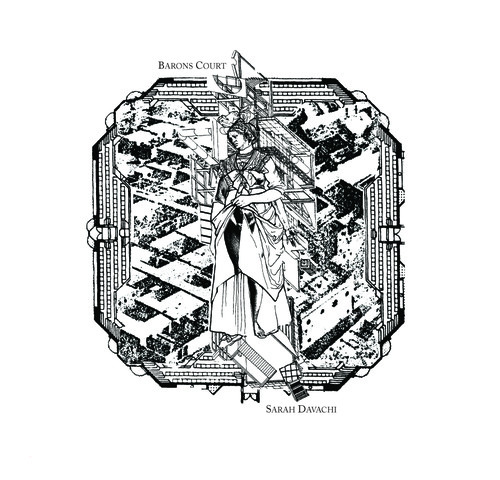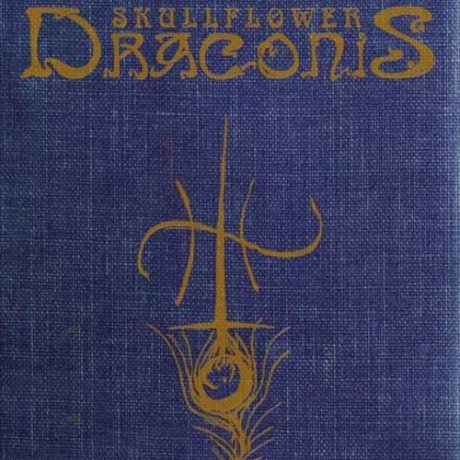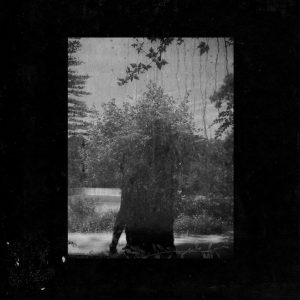News & Events
Barons Court is the debut full-length album by Canadian electroacoustic composer Sarah Davachi, following short-run releases on Important Records' Cassauna imprint and Full Spectrum.
Trained at Mills College, Davachi's work marries an academic approach to synthesis and live instrumentation with a preternatural attunement to timbre, pacing, and atmosphere. While the record employs a number of vintage and legendary synthesizers, including Buchla's 200 and Music Easel, an EMS Synthi, and Sequential Circuit's Prophet 5, Davachi's approach to her craft here is much more in line with the longform textural minimalism of Eliane Radigue than it is with the hyper-dense modular pyrotechnics of the majority of her synthesist contemporaries.
Three of the album's five compositions feature acoustic instrumentation (cello, flue, harmonium, oboe, and viola, played by Davachi and others) which is situated alongside a battery of keyboards and synths and emphasizes the composerly aspect of her work. "Heliotrope" slowly billows into being with a low, keeling drone that is gradually married to an assortment of sympathetic, aurally complex sounds to yield a rich fantasia of beat frequencies and overtones. Later, "Wood Green" opens almost inaudibly, with lovely eddies of subtly modulating synth clouds evolving effortlessly into something much larger, as comforting and familiar as it is expansive. In an era in which the synthesizer inarguably dominates the topography of experimental music, Davachi's work stands alone - distinctive, patient, and beautiful.
More information can be found here.

Hamburg's Marc Richter has been busy since his last Type appearance (2009's genre-bending and critically acclaimed Alphabet 1968). Aside from helming the prolific Dekorder imprint, he's put out a number of musical curios, including 2012's excellent film soundtrack EARTH. Now Richter is back with Alphabet 1968's proper followup, a sprawling double album pieced together with crumbling samples, vocal snippets and an arsenal of noise generators and filters.
Richter's material has always been characterized by an air of surrealism, but it's never been more obvious than on the pulsing, chattering opener "Human Gidrah" or in the delirious fractured pop of "Hands." There are real songs in hidden somewhere, but disintegrated by Richter's sound manipulation techniques and dissolved into soupy extended drone marathons. The centerpiece is undoubtedly "Is Nowhere," which builds slowly over 20 minutes with rumbling organ sounds and buzzing filters, never budging your attention for a second.
Black To Comm is a deeper, more challenging record than its predecessor, but one which repays the patient listener. Richter's dusty, unique sound has never sounded more well-honed and pointed, and it's a patchwork of ideas and fragments that only improves over time.
More information can be found here.

Sea Island is a collection of new material composed and recorded over the past two years. While many of these compositions were performed live extensively prior to recording, others were constructed in the studio and are being heard for the first time here. Musically, the album represents a range of compositional approaches. Murky, densely textured depths of sound are explored with subtle pulses and pings woven within, contrasted with composed or improvised moments of acoustic instrumentation making a move into the foreground. Certain tracks on Sea Island such as album opener "Ahull" make rhythm their focus by exploring subtle polyrhythms and investigating colliding moments of repetition and variation.
Though staunchly electronic at its core, instruments such as vibraphone and piano make appearances, and layers of live musicality, improvisation and detail appear in the looped and layered beds of manipulated sound recordings. A varied cast of players appear in the loscil ensemble, some familiar collaborators from the past such as Jason Zumpano on rhodes and Josh Lindstrom on vibraphone, and others new to the mix such as Fieldhead's Elaine Reynolds who provides layered violin on "Catalina 1943," and Ashley Pitre contributing vocals on Bleeding Ink. Seattle pianist Kelly Wyse, who collaborated with loscil on his 2013 edition of piano-centric reworks Intervalo, performs on the tracks "Sea Island Murders" and "En Masse."
More information can be found here.

Synapse-scorching occult-industrial-prog-noise-folk from the strings of Matthew Bower and Samantha Davies.
Churning mantras and drukpa elegies for two erased darkside tree limbs: that of the Draconian in Khem, and of Drax Priory in West Yorkshire, which together with Bhutan are the Dragon Lands. The twilight language of flowers is spoken and wolves are raised, finally, Kali dances. For fans of Bathory and Popul Vuh.
Comes in a deluxe 6-panel outsized double-digipak with a 16-page booklet.
More information is available here.


"Ruins was made in Aljezur, Portugal in 2011 on a residency set up by Galeria Zé dos Bois. I recorded everything there except the last song, which I did at mother's house in 2004. I'm still surprised by what I wound up with. It was the first time I'd sat still for a few years; processed a lot of political anger and emotional garbage. Recorded pretty simply, with a portable 4-track, a Sony stereo mic and an upright piano. When I wasn't recording songs I was hiking several miles to the beach. The path wound through the ruins of several old estates and a small village.
The album is a document. A nod to that daily walk. Failed structures. Living in the remains of love. I left the songs the way they came (microwave beep from when power went out after a storm); I hope that the album bears some resemblance to the place that I was in."
More information is available here.
M. Geddes Gengras returns with the anticipated follow-up to his critically acclaimed Collected Works Vol. 1 The Moog Years (Umor Rex 2013). The music on New Process Music constitutes his first recordings of purely modular composition; while the album was recorded between 2011 and 2012 it has never been released before and we are pleased to present it for the first time as the Vol. 2 of his Collected Works series.
New Process Music represents a major aesthetic shift for M. Geddes Gengras, fusing the long-form modular compositions he had been exploring on a bevy of small-run cassette releases with a new obsession with post-production editing to create a deeply tuned aural environment, lush in analog electronics that are gritty along the edges, with rich textures and melodies materializing and wafting away like smoke. For New Process Music, Gengras used only a small eurorack synth and magnavox tape echo for the tracking process; the pieces that emerge act as documents of an artist exploring the limits of his chosen instruments. Most of the patches here were originally written for performance and recorded live. Sequences are twisted and bent, turned in on themselves or combined with random information. Longer tracks like "Slider" and "The Last Time We Were Here" zigzag across scales, the latter emulating the endless keyboard technique that was highlighted on Collected Works Vol. 1: The Moog Years, while the former takes the form of a bubbling kosmiche workout that collapses under its own momentum. Shorter pieces like "Glass Dance" and "Relation" offer fractured sequences that refuse to resolve over wavering beds of drone and shade. The overall effect is that of a richly detailed sound world that envelops the listener in a deeply personal space.
Out November 18th.
More information here.

After releasing a first glimpse in the form of the Atomos VII EP earlier this year, A Winged Victory For The Sullen reveal their second full-length album entitled Atomos which sees the duo introduce flurries of electronics, harp and modular synthesizers to their sound in the follow-up to the 2011 self- titled album.
In 2013 AWVFTS caught the ear of Wayne McGregor, founder of Random Dance Company and resident choreographer at the Royal Ballet, who is perhaps best known for his choreography work on the Radiohead video "Lotus Flower" as well as "Ingenue" by Atoms For Peace. McGregor used the debut album as the warm-up music during practice sessions for Random, and after noticing the group's reaction with the music, he contacted Adam and Dustin to see if they would write the score for his new work.
Given complete artistic freedom, the duo treated the score with the same care and attention as their debut full-length by recording more than sixty minutes of music over a four-month period across studios in Brussels, Berlin and Reykjavik with the help of their long time collaborative sound engineer Francesco Donadello. During the process they came to the realization that this would become their official second studio album. McGregor provided them with the inspiration to expand their sound palette into more electronic territory, whilst keeping their signature chamber sound, resulting in a very unique release.
More information is available here.

Trouble is the brand new dispatch from the assorted output of Kevin Drumm and sits as one of the quietest in his entire catalogue. A single continuous 54-minute excursion into the netherworld of the audio spectrum, Trouble is neither ambient nor drone but a more complex investigation into the deep recesses of sound. One which discreetly works itself into the mind of a listener willing to invest in the path laid out in this extremely subtle, beautiful and exceptional release.
More information can be found here.


When Sunn O))) first approached Scott Walker about appearing on their 2009 album Monoliths & Dimensions, little did they know what it would actually lead to. Four years on, Scott was back with something even more enticing, collaborating on Soused, a body of work he was writing with them in mind.
Recorded in London in early 2014 and produced by Scott Walker and long-time ally Peter Walsh with the assistance of musical director Mark Warman, Soused is a 5-track 18-minute body of work that cements both acts’ wide-reaching and otherworldly renown.
Out October 20th on 4AD.
More information and a brief trailer can be found here.


